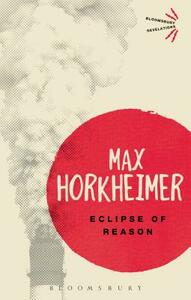Take a photo of a barcode or cover
challenging
informative
reflective
slow-paced
challenging
informative
reflective
medium-paced
One of the first books I came across on my journey into critical theory. I would say that this may be a hard text for someone coming straight into the Frankfurt School, as it relies on the knowledge of and familiarity with a vast amount of philosophical history. In my view, this may make the first two chapters hard to decipher for someone without that background.
That said, this book is a masterpiece. After chapter 2, we get into what is, in my view, the main argument of the text. This builds up through chapters 4 and 5 into a wonderful critique of modern "reason", and the un-examined bases for its so-called superiority. Horkheimer instead argues for a better version of philosophy, one that seeks to find real truth, and not one backstopped by man's self-imposed ideologies.
That said, this book is a masterpiece. After chapter 2, we get into what is, in my view, the main argument of the text. This builds up through chapters 4 and 5 into a wonderful critique of modern "reason", and the un-examined bases for its so-called superiority. Horkheimer instead argues for a better version of philosophy, one that seeks to find real truth, and not one backstopped by man's self-imposed ideologies.
kitapta tek bir fikir var. bu fikir, farklı olgular yardımıyla beş farklı başlık altında tekrar tekrar açıklanıyor. Metin, bir süre sonra kendisini tekrar etmeye ve okurunu yormaya başlıyor. Orhan Koçak'ın yazdığı önsöz de yaklaşık kitabın yarısı kadar. Bu kadar abartılı bir önsöz yazıp frankfurt okulu'na giriş dersi vermeye gerek var mıydı bilmiyorum.
Bunalım...Disiplinlerin gerçek anlamda sürüklendikleri akıl tutulmalarından yaşadıkları bunalım. Karşı mevzilerde olmak, çatışmalı, tamamen farklı olgulardan bahsetmek, konvansiyonel olmayan tutumlar, disiplinleri aynı akıl tutulmalarından alıkoyamamıştır. Sular onları farklı ırmaklardan akıtarak aynı göle taşımıştır ve bir arada olduklarını görmek mümkün...Genele baktığımda ortaya çıkarabildiğim hakim olan tematik durum budur. Sebebi doğallığındaMax Horkheimer ve Okulu olan Frankfurt okulu'nun ortaya koyduğu temel teori, Eleştiri Teorisidir. Bu okul bir diğer anlamda tüm disiplinler ( Felsefe Okulları veya Teorileri) üzerinde, kritik etme görevini üstlenmiş, benim fark edebildiğim kadarıyla, disiplinlerin daha çok ortaya çıkış noktasına değil, bu disiplinlerin diğerleri ile giriştikleri ideolojik çatışmalardan doğan sonuçlar üzerinden eleştiri teorisi geliştirmişlerdir.
Kitabın giriş kısmında çevirisi ile Orhan Koçak, yaklaşık elli sayfalık bir önsöz ile bize Max Horkheimer ve Frankfurt Okulu hakkında detaylı bilgi vermiştir.Önsöz ile bu okul hakkında detaylı bilgiye ulaşmış oluyoruz.
Okulun Marksizm, Marksist kurumlar ile ve ayrıca kendi içindeki hesaplaşmaları da açıkça öğrenmiş oluyoruz.
Kitap içerisinde düşünsel yaşamda araçlar-amaçlar, öznel-nesnel akıl paradokslarını detaylı görebiliriz. Bununla birlikte; bize önerilen reçetelerin kendi aralarındaki çatışmalarını, tehlikeli düşünsel süreçlerin doğa içerisindeki biyolojik sistemleri kullanışı, dolayısıyla bunlar karşısında bireyin yükselişi aynı zamanda düşüşü ilginizi çekebilir.
Modernitenin bilinci nerelere kadar sürükleyebileceğini ve bizler üzerindeki tahakkümünden dolayı bedenimizin, zihnimizin, sosyal yapımızın ve bir çok alanımız ile araçsallaşmış görüntümüze ayna tutarak farkındanlığımıza yardımcı olmaktadır.
Direnen birey, doğruluğun gerekleriyle varoluşun akıl dışı niteliğini uzlaştırmaya yönelik her türlü pragmatik çabaya karşı çıkacaktır.s.133
Kitabın giriş kısmında çevirisi ile Orhan Koçak, yaklaşık elli sayfalık bir önsöz ile bize Max Horkheimer ve Frankfurt Okulu hakkında detaylı bilgi vermiştir.Önsöz ile bu okul hakkında detaylı bilgiye ulaşmış oluyoruz.
Okulun Marksizm, Marksist kurumlar ile ve ayrıca kendi içindeki hesaplaşmaları da açıkça öğrenmiş oluyoruz.
Kitap içerisinde düşünsel yaşamda araçlar-amaçlar, öznel-nesnel akıl paradokslarını detaylı görebiliriz. Bununla birlikte; bize önerilen reçetelerin kendi aralarındaki çatışmalarını, tehlikeli düşünsel süreçlerin doğa içerisindeki biyolojik sistemleri kullanışı, dolayısıyla bunlar karşısında bireyin yükselişi aynı zamanda düşüşü ilginizi çekebilir.
Modernitenin bilinci nerelere kadar sürükleyebileceğini ve bizler üzerindeki tahakkümünden dolayı bedenimizin, zihnimizin, sosyal yapımızın ve bir çok alanımız ile araçsallaşmış görüntümüze ayna tutarak farkındanlığımıza yardımcı olmaktadır.
Direnen birey, doğruluğun gerekleriyle varoluşun akıl dışı niteliğini uzlaştırmaya yönelik her türlü pragmatik çabaya karşı çıkacaktır.s.133
This book needs to be reviewed in the context of the time it was published, namely after Horkheimer escaped Germany while it was under Hitler's rule. It's true that most of the book rings more true than ever today but parts of it now feel dated.
Horkheimer begins by making a distinction between subjective reason, the reasoning you use to reach a certain goal, and objective reason, the reasoning you use to question the virtue of the goal in and of itself. He then makes the argument that Western Philosophy has seen a shift towards the later. While I agree that this shift is happening and is all too clear today, I don't agree with Horkheimer's criticism of science that it's becoming too subjective and it only concerns itself with how to do something rather than if this something should be done at all. I believe that the institution of science should remain only concerned with subjective reason (the way Horkheimer defined it) as this seems to be the best way to acquire truth about the given that truth is our goal.
In Chapter 2, Horkheimer criticizes Positivism, Neo-Thomism and Pragmatism in great length. I agree with his criticisms of both Neo-Thomism and Pragmatism but when criticizing Positivism I found the argument ... unfulfilling. He argues that science, which positivists wholeheartedly embrace, can be used to do serve evil means and more over, in this capitalist world, science is only done to serve a producing entity or corporation and rarely for its own merit of finding out the truth. He then continues by criticizing the scientific method itself and pointing out it's limitations for finding the truth. What I find unfulfilling is that this view of science might have been spurred by the use of the first atomic bomb few years prior to the writing of the book. The picture might have been bleak then but it's certainly much better now though the positivists' philosophy still suffers from the same problems Horkheimer mentioned up until now albeit to a lesser degree.
As for Chapter 3, the image Horkheimer paint of the relationship between man and nature is both fascinating and bleak. He talks about the domination of man over nature and how nature is view as just a tool, the repression it breeds in man and the memetic nature of man that he uses to deal with this struggle.
Chapter 4 describes the effect of social injustice, culture, economics, mass culture and oppression on the individual. How all of this forces conformity until it becomes the norm and the individual instead of challenging that begins to form an interest in maintaining it. All of which are thoughts that we can identify with today.
It's a good, albeit philosophically dense and a bit hard to go through, book and you will find compelling critiques that are still relevant to our world today.
Horkheimer begins by making a distinction between subjective reason, the reasoning you use to reach a certain goal, and objective reason, the reasoning you use to question the virtue of the goal in and of itself. He then makes the argument that Western Philosophy has seen a shift towards the later. While I agree that this shift is happening and is all too clear today, I don't agree with Horkheimer's criticism of science that it's becoming too subjective and it only concerns itself with how to do something rather than if this something should be done at all. I believe that the institution of science should remain only concerned with subjective reason (the way Horkheimer defined it) as this seems to be the best way to acquire truth about the given that truth is our goal.
In Chapter 2, Horkheimer criticizes Positivism, Neo-Thomism and Pragmatism in great length. I agree with his criticisms of both Neo-Thomism and Pragmatism but when criticizing Positivism I found the argument ... unfulfilling. He argues that science, which positivists wholeheartedly embrace, can be used to do serve evil means and more over, in this capitalist world, science is only done to serve a producing entity or corporation and rarely for its own merit of finding out the truth. He then continues by criticizing the scientific method itself and pointing out it's limitations for finding the truth. What I find unfulfilling is that this view of science might have been spurred by the use of the first atomic bomb few years prior to the writing of the book. The picture might have been bleak then but it's certainly much better now though the positivists' philosophy still suffers from the same problems Horkheimer mentioned up until now albeit to a lesser degree.
As for Chapter 3, the image Horkheimer paint of the relationship between man and nature is both fascinating and bleak. He talks about the domination of man over nature and how nature is view as just a tool, the repression it breeds in man and the memetic nature of man that he uses to deal with this struggle.
Intellectually, modem man is less hypocritical than his forefathers of the nineteenth century who glossed over the materialistic practices of society by pious phrases about idealism. Today no one is taken in by this kind of hypocrisy. But this is not because the contradiction between high-sounding phrases and reality has been abolished. The contradiction has only become institutionalized. Hypocrisy has turned cynical; it does not even expect to be believed. The same voice that preaches about the higher things of life, such as art, friendship, or religion, exhorts the hearer to select a given brand of soap. Pamphlets on how to improve one's speech, how to understand music, how to be saved, are written in the same style as those extolling the advantages of laxatives. Indeed, one expert copywriter may have written any one of them. In the highly developed division of labor, expression has become an instrument used by technicians in the service of industry. A would-be author can go to a school and learn the many combinations that can be contrived from a list of set plots. These schemes have been coordinated to a certain degree with the requirements of other agencies of mass culture, particularly those of the film industry. A novel is written with its film possibilities in mind, a symphony or poem is composed with an eye to its propaganda value. Once it was the endeavor of art, literature, and philosophy to express the meaning of things and of life, to be the voice of all that is dumb, to endow nature with an organ for making known her sufferings, or, we might say, to call reality by its rightful name. Today nature’s tongue is taken away. Once it was thought that each utterance, word, cry, or gesture had an intrinsic meaning; today it is merely an occurrence.
Chapter 4 describes the effect of social injustice, culture, economics, mass culture and oppression on the individual. How all of this forces conformity until it becomes the norm and the individual instead of challenging that begins to form an interest in maintaining it. All of which are thoughts that we can identify with today.
It's a good, albeit philosophically dense and a bit hard to go through, book and you will find compelling critiques that are still relevant to our world today.
informative
slow-paced
He presents a lot of arguments, all of which are wrong, and gives very little evidence for them. Well, he does give evidence, but this whole book is just one long non sequitur. Not very good.
challenging
informative
reflective
slow-paced
All reviews - https://jdcloughblog.wordpress.com/2018/04/09/max-horkheimer-eclipse-of-reason/
Horkheimer is my sort of thinker. He writes with the perfect combination of exceptional erudition and a burning passion that would make Nietzsche proud. The Eclipse of Reason is an unrelenting assault on the various disciplines that fall prey to what Horkheimer describes as subjective reason. That is, in brief, the reason by which the means for achieving predetermined or ‘self-evident’ ends, where objective reason is the testing of those ends. Horkheimer believes that virtually every element of society is suffering from the glorification of subjective reason as the only reason, which leads, he believes, to the inevitable descent into relativism, which in turn undermines the meanings of every action, and drags society kicking and screaming into a nihilistic abyss.
Indeed, there is not a lot of positivity to be found in Horkheimer’s writing; but this is to be expected from a work written by a German Jew in 1947. In Horkheimer’s view, expressed here and in The Dialectic of Enlightenment, WWII with it’s Holocaust and nuclear obliteration is the genuine culmination of the Enlightenment – the inevitable outcome of the rise and fall of reason. We placed our faith in science, and science repaid us in kind with the most ruthlessly effective means of wholesale destruction of human life ever imagined. This utterly destructive manifestation of our supposed “enlightenment” is the most stark, brutal, and painful testament to how lost we are as a species. It is in this context that Horkheimer writes; his continuing relevance suggests we are far from recovered from this nadir.
Horkheimer essentially believes that reason ate itself. In The Enlightenment it positioned itself – though not initially explicitly – as a challenger to the crown of religion as the leading source of cultural meaning-making. Calling on Weberian terminology, Horkheimer discusses how this lead to the world becoming increasingly demystified, the magic of the world was all being rationalised and explained away. As the philosophers and scientists who represent the clergy of the Church of Reason would have it, this demystification served to free humanity from irrational dogma and superstition – we have become Enlightened. Horkheimer suggests that, nice as this sounds, the rise of reason contained in its demystifying character the seed of its own downfall. By stripping the world of its magic – of its value-external-from-itself – reason accidentally denied the existence of any absolute values, truths, and meanings. Objective reason, in the hands of vastly influential sceptics such as Hume, sabotages itself by denying the existence of absolutes. Of course, Kant and so many who come after try to save this, but for Horkheimer, the damage has been done. In spite of Kant and others’ no doubt formidable input, meta-ethics – questions of what is good and bad – suffered throughout the 20th century and beyond with the blight of relativism, a startling inability to find fundamental justification for any view of the good without recourse either to the divine or to the ultimate replacement for ‘it is as God wills’: ‘it just is!’*
The result, for Horkheimer, is that as a society, we have given up on objective reason – it discredited religion and it discredited itself. To fill the void, reason itself falls prey to dogma: the belief that subjective reason, epitomised in the scientific method, somehow possesses universal truth. While most scientists today are more than aware of the profound limits of the scientific method (perhaps in part due to the awakening brought about by philosophical opposition to scientism), what’s key for Horkheimer is the way in which culture has made science its religion. This is science taken in a much broader meaning than simply the academic disciplines of the natural sciences. It’s perhaps better captured under the term positivism, which is the view that only that which is scientifically verifiable is worthy of consideration. This is an ideological perspective that remains relentlessly pervasive throughout academia and in society more broadly.
For me, Eclipse of Reason contained three key, interconnected elements of this positivistic outlook. The first is a discussion of positivism’s philosophical advocate – pragmatism. The second is an examination of this view and how it impacts our relationship to nature. Finally, Horkheimer views this outlook in terms of what it means for the individual. I would be writing for a long time if I were to go into detail regarding all of these elements. Needless to say, they add up to a quite merciless attack on dominant cultural values. For me personally, the most interesting element was the discussion around nature. Here he talks about how turning everything into means renders nature beyond its purpose to industry meaningless. This links to the subjugation of people’s own nature, which they must overcome in order to survive in society. I found this chapter profound and it links with a number of other important writings from the likes of Arendt and Heidegger to provide an important critique of our approach to nature. It’s perhaps more relevant in our time than ever.
Eclipse of Reason, then, is unfalteringly bleak in its outlook. Horkheimer masterfully and passionately diagnoses the sickness in our society, and his outlook is grim. This is perhaps a shortcoming – not only Horkheimer but many of those writing in the lose tradition of the Frankfurt School or critical theory – what use is diagnosis without a cure? It’s not an easy question to answer. Horkheimer and his like, however, exist as an absolutely essential foil to orthodox culture and theory. These are the kind of thinkers we need in order to know where we stand, to focus our minds in the right direction. For this, Horkheimer’s work is priceless.
*This isn’t to say there’s been no good ethics for the last 100 years or more. I found Løgstrup’s attempt at justifying kindness in phenomenological terms valiant. The issue is that reason throws into doubt any claim to the absolute.
Horkheimer is my sort of thinker. He writes with the perfect combination of exceptional erudition and a burning passion that would make Nietzsche proud. The Eclipse of Reason is an unrelenting assault on the various disciplines that fall prey to what Horkheimer describes as subjective reason. That is, in brief, the reason by which the means for achieving predetermined or ‘self-evident’ ends, where objective reason is the testing of those ends. Horkheimer believes that virtually every element of society is suffering from the glorification of subjective reason as the only reason, which leads, he believes, to the inevitable descent into relativism, which in turn undermines the meanings of every action, and drags society kicking and screaming into a nihilistic abyss.
Indeed, there is not a lot of positivity to be found in Horkheimer’s writing; but this is to be expected from a work written by a German Jew in 1947. In Horkheimer’s view, expressed here and in The Dialectic of Enlightenment, WWII with it’s Holocaust and nuclear obliteration is the genuine culmination of the Enlightenment – the inevitable outcome of the rise and fall of reason. We placed our faith in science, and science repaid us in kind with the most ruthlessly effective means of wholesale destruction of human life ever imagined. This utterly destructive manifestation of our supposed “enlightenment” is the most stark, brutal, and painful testament to how lost we are as a species. It is in this context that Horkheimer writes; his continuing relevance suggests we are far from recovered from this nadir.
Horkheimer essentially believes that reason ate itself. In The Enlightenment it positioned itself – though not initially explicitly – as a challenger to the crown of religion as the leading source of cultural meaning-making. Calling on Weberian terminology, Horkheimer discusses how this lead to the world becoming increasingly demystified, the magic of the world was all being rationalised and explained away. As the philosophers and scientists who represent the clergy of the Church of Reason would have it, this demystification served to free humanity from irrational dogma and superstition – we have become Enlightened. Horkheimer suggests that, nice as this sounds, the rise of reason contained in its demystifying character the seed of its own downfall. By stripping the world of its magic – of its value-external-from-itself – reason accidentally denied the existence of any absolute values, truths, and meanings. Objective reason, in the hands of vastly influential sceptics such as Hume, sabotages itself by denying the existence of absolutes. Of course, Kant and so many who come after try to save this, but for Horkheimer, the damage has been done. In spite of Kant and others’ no doubt formidable input, meta-ethics – questions of what is good and bad – suffered throughout the 20th century and beyond with the blight of relativism, a startling inability to find fundamental justification for any view of the good without recourse either to the divine or to the ultimate replacement for ‘it is as God wills’: ‘it just is!’*
The result, for Horkheimer, is that as a society, we have given up on objective reason – it discredited religion and it discredited itself. To fill the void, reason itself falls prey to dogma: the belief that subjective reason, epitomised in the scientific method, somehow possesses universal truth. While most scientists today are more than aware of the profound limits of the scientific method (perhaps in part due to the awakening brought about by philosophical opposition to scientism), what’s key for Horkheimer is the way in which culture has made science its religion. This is science taken in a much broader meaning than simply the academic disciplines of the natural sciences. It’s perhaps better captured under the term positivism, which is the view that only that which is scientifically verifiable is worthy of consideration. This is an ideological perspective that remains relentlessly pervasive throughout academia and in society more broadly.
For me, Eclipse of Reason contained three key, interconnected elements of this positivistic outlook. The first is a discussion of positivism’s philosophical advocate – pragmatism. The second is an examination of this view and how it impacts our relationship to nature. Finally, Horkheimer views this outlook in terms of what it means for the individual. I would be writing for a long time if I were to go into detail regarding all of these elements. Needless to say, they add up to a quite merciless attack on dominant cultural values. For me personally, the most interesting element was the discussion around nature. Here he talks about how turning everything into means renders nature beyond its purpose to industry meaningless. This links to the subjugation of people’s own nature, which they must overcome in order to survive in society. I found this chapter profound and it links with a number of other important writings from the likes of Arendt and Heidegger to provide an important critique of our approach to nature. It’s perhaps more relevant in our time than ever.
Eclipse of Reason, then, is unfalteringly bleak in its outlook. Horkheimer masterfully and passionately diagnoses the sickness in our society, and his outlook is grim. This is perhaps a shortcoming – not only Horkheimer but many of those writing in the lose tradition of the Frankfurt School or critical theory – what use is diagnosis without a cure? It’s not an easy question to answer. Horkheimer and his like, however, exist as an absolutely essential foil to orthodox culture and theory. These are the kind of thinkers we need in order to know where we stand, to focus our minds in the right direction. For this, Horkheimer’s work is priceless.
*This isn’t to say there’s been no good ethics for the last 100 years or more. I found Løgstrup’s attempt at justifying kindness in phenomenological terms valiant. The issue is that reason throws into doubt any claim to the absolute.




